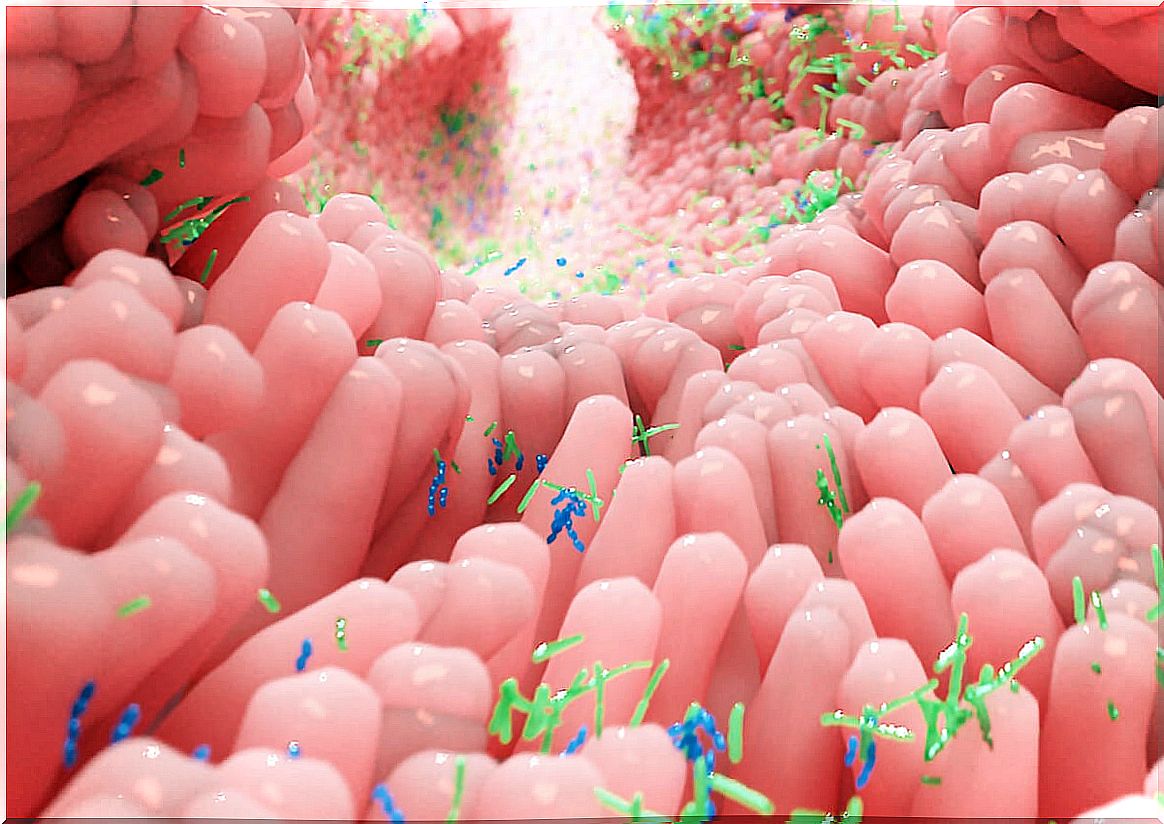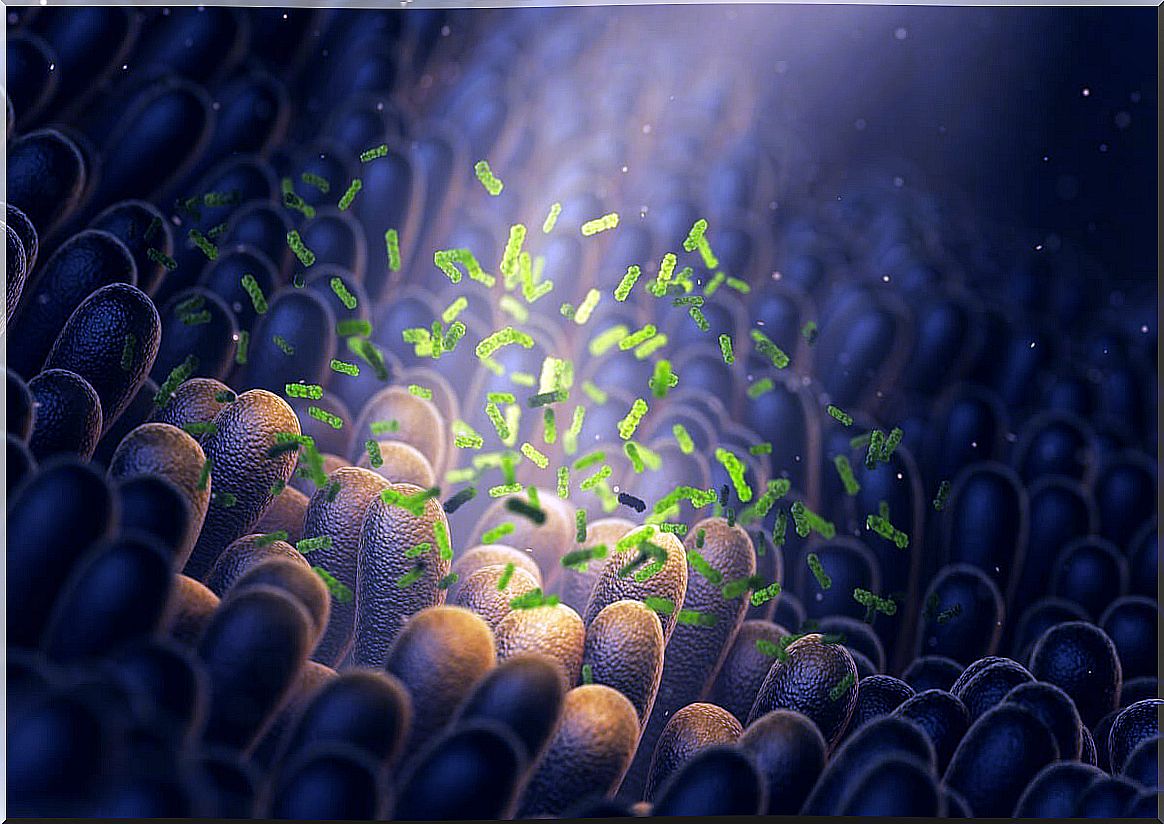Microbiota, Stress And Anxiety: What Do They Have In Common?

Microbiota, stress and anxiety are much more related than it may seem at first. At first, one might think that a high level of stress or anxiety has nothing to do with the balance of the microbiota. However, there is a connection, and it is also direct.
Since the beginning of the 21st century, both the microbiota and its genetic makeup, the microbiome, have been studied on a large scale. The main reason is that the microbiota has been found to play a fundamental role in the development of modern diseases.
Thus, an imbalance in the intestinal microbiota maintained over time, known as intestinal dysbiosis, predisposes people to develop multiple diseases. In this article we analyze the reasons.

How exactly does the microbiota affect us?
The microbiota is the set of bacteria and microorganisms present in a habitat. To describe how the microbiota affects organisms, Eugene Rosenberg proposed a few years ago the theory of hologenome evolution. This theory contemplates that all living beings establish a symbiotic relationship with the microorganisms that inhabit them. The living being would be the host and the microbiota would be hosted in it. The set of both is called a holobiont.
The hologenome would be the sum of the genetic information of a living being plus that of the microbiota that inhabits it and both influence each other. In fact, on many occasions, the genetic information of the microbiota has a determining role, even greater than that of the organism that hosts it. For this reason, the microbiota has such a prominent influence on health.
How are microbiota, anxiety and stress related?
Once the role of the microbiome is highlighted, we can begin to understand why it is closely related to anxiety. And is that the microbiota affects many body systems, including the central nervous system.
Studies from the last decade explain how the microbiota produces some of the most important neurotransmitters for brain function. These include cortisol, norepinephrine, serotonin, dopamine, GABA, and acetylcholine. These neurotransmitters play a fundamental role in our behavior.
The communication pathway between the gut microbiota and the central nervous system is the gut-brain axis. Through this axis, the gut microbiota transmits information to the central nervous system. In case of intestinal dysbiosis, the signal that is transmitted generates multiple reactions in the body, among them a pro-inflammatory state, an increase in oxidative stress and a greater cellular degeneration.
Many authors consider that intestinal dysbiosis influences the development of disorders such as anxiety, stress or depression. For this reason, researchers are investigating how the symptoms associated with these diseases can be reduced by recovering intestinal balance.
The role of prebiotics and probiotics in anxiety and stress
In some studies, such as that of Bruce Stevens (Stevens et al., 2018), patients with chronic anxiety were found to have a less diverse gut microbiota than usual.
In another study by Kim and de la Serre, chronically stressed people were found to have altered gut microbiota.
There are authors who consider that current treatments to treat anxiety or chronic stress situations are not too effective, and therefore propose using other therapeutic strategies. One of the most prominent is to influence the microbiota through prebiotics and probiotics.
Prebiotics
According to the FAO (Food and Agriculture Organization), prebiotics are food ingredients that produce changes in the composition of the intestinal microbiota and that provide a benefit to the individual. Therefore, its consumption can significantly help improve the state of the microbiota and therefore of physical and mental health.
Not all foods have a prebiotic effect. To do this, they must be resistant to gastric acidity and intestinal absorption. In addition, they must be selectively fermented by beneficial bacteria of the intestinal microbiota and must induce physiological effects beneficial to health.
Some of the foods with a prebiotic effect are rich in soluble fibers such as pectins, mucilages or fructans. Insoluble fibers like resistant starch also have a very interesting prebiotic effect.
Probiotics
Probiotics are live microorganisms that, when consumed in adequate amounts, exert a beneficial effect on the health of the host. Although the predominant studies are mostly in animals, there are some that have shown the effectiveness of probiotics to treat anxiety and stress.
For example, Mohammadi et al. showed that capsules with bacterial agents in yogurt improved anxiety. Likewise, the study by Messaoudi et al. demonstrated the improvement of stress and anxiety levels by supplementing a combination of probiotics.

Microbiota, anxiety and stress: a long-term relationship
More and more studies link the state of the gut microbiota with the development of mental disorders, such as anxiety or chronic stress. It is true that it is not the only factor that determines the appearance of these disorders; however, it can influence the onset and intensity of symptoms.
From current research, the use of prebiotics and probiotics as a treatment for symptoms of stress and anxiety seems a therapeutic option to consider. However, the number of human studies is still small and it is necessary to wait for more scientific evidence to determine its efficacy.








